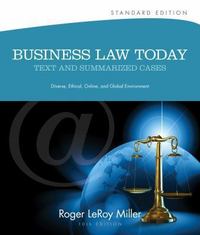A Question of EthicsSection 1 of the Sherman Act. In the 1990s, DuCoa, LP, made choline chloride,
Question:
A Question of Ethics—Section 1 of the Sherman Act.
In the 1990s, DuCoa, LP, made choline chloride, a B-complex vitamin essential for the growth and development of animals.
The U.S. market for choline chloride was divided into thirds among DuCoa, Bioproducts, Inc., and Chinook Group, Ltd.
To stabilize the market and keep the price of the vitamin higher than it would otherwise be, the companies agreed to fix the price and allocate market share by deciding which of them would offer the lowest price to each customer. At times, however, the companies disregarded the agreement. During an increase in competitive activity in 1997, Daniel Rose became president of DuCoa and found out about the conspiracy.
In 1998, Rose implemented a strategy to persuade DuCoa’s competitors to rejoin the conspiracy. By April, the three companies had reallocated their market shares and increased their prices. In June, the U.S. Department of Justice began to investigate allegations of price fixing in the vitamin market. Ultimately, Rose was convicted of conspiracy to violate Section 1 of the Sherman Act. [United States v. Rose, 449 F.3d 627 (5th Cir. 2006)] (See pages 836–840.)
1. The court “enhanced” Rose’s sentence to thirty months’
imprisonment, one year of supervised release, and a $20,000 fine because of his role as “a manager or supervisor” in the conspiracy. Rose appealed this enhancement. Was it fair to increase Rose’s sentence on this ground? Why or why not?
2. Was Rose’s participation in the conspiracy unethical? If so, how might Rose have behaved ethically instead? Explain.
Step by Step Answer:






